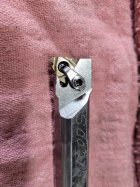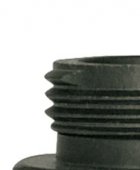Am wondering how manufactures Cut the barrel receiving threads into a rifle action. Are they cut with a tap or cut on a lathe?
Install the app
How to install the app on iOS
Follow along with the video below to see how to install our site as a web app on your home screen.
Note: This feature may not be available in some browsers.
You are using an out of date browser. It may not display this or other websites correctly.
You should upgrade or use an alternative browser.
You should upgrade or use an alternative browser.
How are the barrel threads cut in an action?
- Thread starter Wellington
- Start date
Dusty Stevens
Shiner
Single point cut in a lathe
Walt Krafft
Gold $$ Contributor
Thread milled on a cnc milling machine.
I think Dusty and Walt are both right. Some are thread milled and others are single point lathe cut. None are tapped....that I know of. I'm talking customs. Anything goes for factory stuff but I doubt they are tapped either.
Doug Beach
Silver $$ Contributor
I’ve seen R700’s that look like the thread mill was missing a few teeth.
John11-87
Silver $$ Contributor
Dusty Stevens
Shiner
Hardened screwdriverInternal threading tool.. maybe a thread mill.
I know for sure that Remington uses a dull beaver.
D-4297
Gold $$ Contributor
That's because the threading tool that cuts O.D. threads on a barrel is supported much more solidly than the "Boring Bar" type tool used to cut the threads within the action . And some of it may be caused by either trying to take to large a cut , causing flex in the tool , or to light a cut , not "forcing the cutting edge to "Load" properly .
jackieschmidt
Gold $$ Contributor
It depends on the manufacturer. The ones with the latest CAD/CAM Machines probably thread mill.
John11-87
Silver $$ Contributor
Thread milling is super handy, we use it alot on small threaded holes 6-32 - 10-32 in certain material. On our Mazak machinery, the newer stuff anyway, there is a cycle for thread milling so CAM software isn't needed luckily.It depends on the manufacturer. The ones with the latest CAD/CAM Machines probably thread mill.
I've never thread milled a big thread, like a receiver, but it can be, and definitely is done. I can see it being beneficial for a custom action manufacturer on small blind holes, for mounting a scope rail or whatever.
The downside to it, for me anyway, is the cost of the thread mill itself. The small ones, like for 6-32 are 180$ a piece. They have a relatively long tool life though, which helps.
Last edited:
The advantages of thread milling are huge compared to single point threading or tapping.
It takes less time than single point threading, makes smaller chips that can easily be evacuated, and results in a shorter imperfect thread. The tool life is longer too.
The main advantage over tapping is that you don't have to burn it out if it breaks. A thread mill will last longer than a tap too.
It takes less time than single point threading, makes smaller chips that can easily be evacuated, and results in a shorter imperfect thread. The tool life is longer too.
The main advantage over tapping is that you don't have to burn it out if it breaks. A thread mill will last longer than a tap too.
John11-87
Silver $$ Contributor
This is my experience aswell. Just hard to justify a thread mill for every application, when a carbide single point thread insert with 3 corners is 22$ and a thread mill is 10-15x that.The advantages of thread milling are huge compared to single point threading or tapping.
It takes less time than single point threading, makes smaller chips that can easily be evacuated, and results in a shorter imperfect thread. The tool life is longer too.
+1 for this, I absolutely despise removing broken taps!The main advantage over tapping is that you don't have to burn it out if it breaks. A thread mill will last longer than a tap too.
This is my experience aswell. Just hard to justify a thread mill for every application, when a carbide single point thread insert with 3 corners is 22$ and a thread mill is 10-15x that.
+1 for this, I absolutely despise removing broken taps!
I managed a machine shop for a very large oilfield service provider. The shop rate for the big Mazaks was north of $250/hr. We could thread mill in the time it took to change tips on an insert.
Thread milling is awesome! When I skeletonize a Remington bolt handle many times I am installing a new knob as well. So, I cut the threads by thread milling. Still running the original thread milling cutter 3 years later! Micro 100 makes some very good tooling. Thread milling generally cuts a beautiful thread, plus it is very easy to modify the thread if needed. A win win in my book.
Paul
Paul
Walt Krafft
Gold $$ Contributor
Before I retired, I was using a cnc lathe with live tooling to make unscrewing cores for plastic nuts. When I went to milling the thread instead of single pointing them, the quality of finish and size control improved a bunch. Tool life was measured in months not pieces. And, we picked up an extra thread by getting right up to the shoulder.
You can do all 3... tap, mill or Single point. Thread milling is fast, and I like a CNC to be equipped with rigid tapping. Tapped and thread milled a bunch in the mill and single point on a lathe...they all work well, and would be precise enough for gun work. I single point in a lathe or if I'm gonna reinstall a factory dia thread I use a tap to clean up action threads in the lathe...then single point barrel to fit action. Barrel interior & chamber quality would be far more important than threads on the barrel and action connecting the two... but I still like a certain snug fit...but doubt it makes a difference as they butt against the recoil lug, or action to take up any thread slack.
Thanks fellas.
It is!Thread milling is awesome! When I skeletonize a Remington bolt handle many times I am installing a new knob as well. So, I cut the threads by thread milling. Still running the original thread milling cutter 3 years later! Micro 100 makes some very good tooling. Thread milling generally cuts a beautiful thread, plus it is very easy to modify the thread if needed. A win win in my book.
Paul
Watched a action get thread milled at a manufacturer here in Washington, plus they do a cool start of the thread with no half thread and a really robust lead in like you see on fire hose threads.
Really cool process.
Attachments
Last edited:
Similar threads
- Replies
- 14
- Views
- 1,036
Upgrades & Donations
This Forum's expenses are primarily paid by member contributions. You can upgrade your Forum membership in seconds. Gold and Silver members get unlimited FREE classifieds for one year. Gold members can upload custom avatars.

Click Upgrade Membership Button ABOVE to get Gold or Silver Status.
You can also donate any amount, large or small, with the button below. Include your Forum Name in the PayPal Notes field.
To DONATE by CHECK, or make a recurring donation, CLICK HERE to learn how.

Click Upgrade Membership Button ABOVE to get Gold or Silver Status.
You can also donate any amount, large or small, with the button below. Include your Forum Name in the PayPal Notes field.
To DONATE by CHECK, or make a recurring donation, CLICK HERE to learn how.











